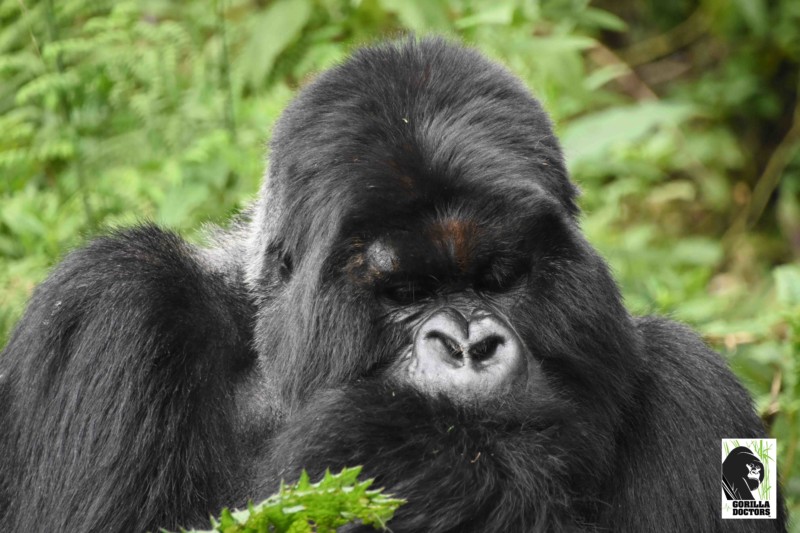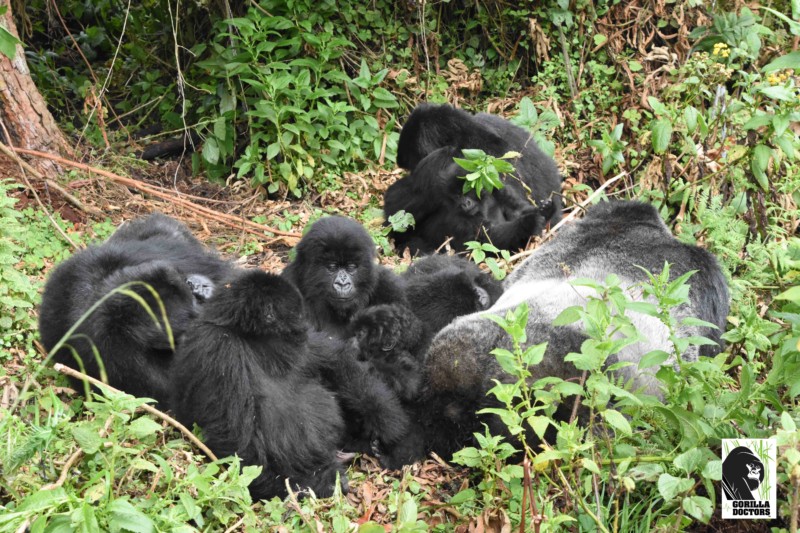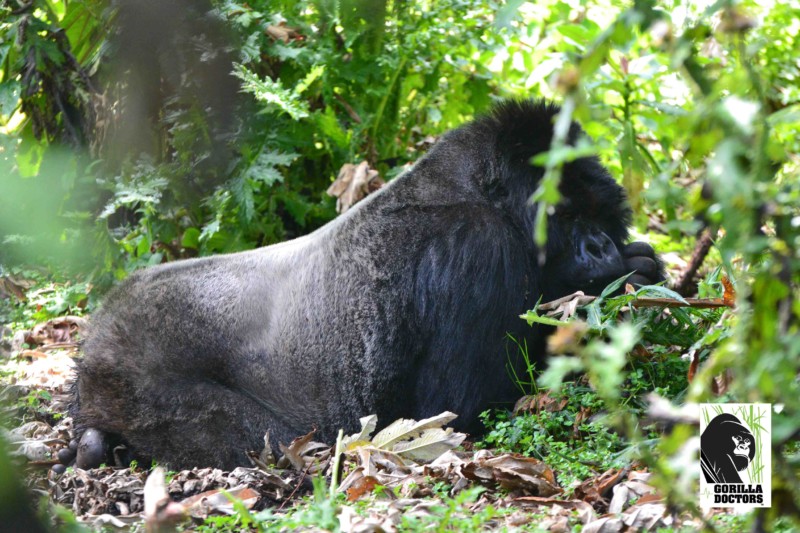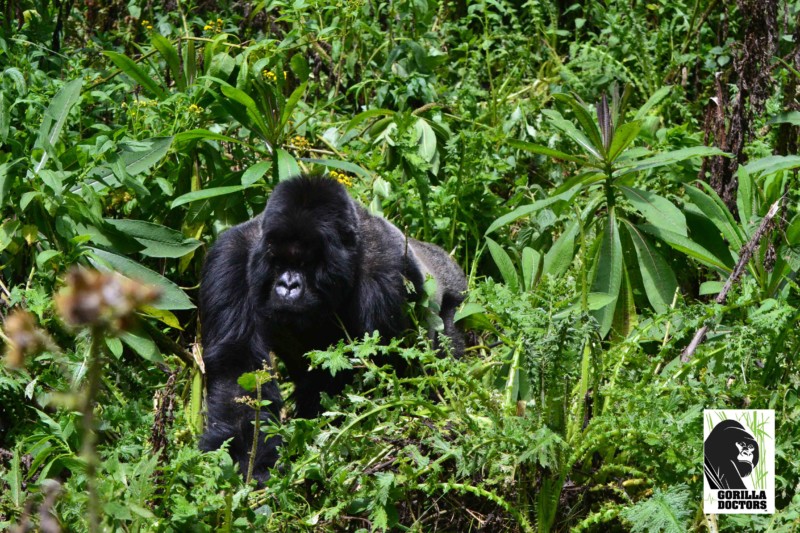Mountain Gorilla Respiratory Infection: Mafunzo Group, Volcanoes National Park, Rwanda
By Gorilla Doctors Staff on Wednesday, April 24th, 2019 in Blog.On April 3rd, the trackers of Mafunzo group reported silverback Mafunzo was coughing frequently and infant Ukwiyunga was sneezing. Gorilla Doctors conducted their first veterinary monitoring visit the next day and has been monitoring the group nearly every day since.
Below is Drs. Noel and Gaspard’s record of their care and monitoring of Mafunzo. Mafunzo has also been fighting with a lone silverback, Mutobo, as part of naturally occurring male-male competition for females.
Respiratory Infection: Field Report from Dr. Jean Bosco ‘Noel’ Noheli and Dr. Gaspard Nzayisenga
Location: Volcanoes National Park, Rwanda
April 3 – 18, 2019
April 3rd – Trackers report signs of potential respiratory infection in Mafunzo group with silverback Mafunzo coughing and infant Ukwiyunga sneezing.
April 4th – Gorilla Doctors trek to Mafunzo group to conduct a Veterinary Monitoring Visit and assess the health of each individual in the group. They observed silverback Mafunzo with a dry cough and three adult females also coughing and sneezing during the two hours Gorilla Doctors assessed the group. Other members of the group appeared normal, but it was determined another monitoring visit would be conducted the following day.
April 5 – 7th – Mafunzo’s coughing was reduced and his overall health parameters were within normal. He was active and feeding and on the 7th trackers reported no coughing and the infection was suspected to have ended. All other group members who were observed with mild clinical signs of respiratory infection had fully recovered without medical support.
April 8th – When Gorilla Doctors conducted their Veterinary Monitoring Visit they discovered five females of Mafunzo’s group were gone. Trackers reported these females had moved to the silverback Mutobo. The two families were approximately 500 meters apart in distance and there was also another unidentified lone silverback in the area. Mafunzo’s coughing had returned and was frequent.
April 9th – 10th – Gorilla Doctors conducted daily Veterinary Monitoring Visits and health assessments, keeping a close watch on Mafunzo’s condition in the event that his illness advanced and treatment would be needed.
April 11th – Veterinarians found Mafunzo moderately lethargic and coughing. His eyelids also appeared to be slightly swollen. Given that Mafunzo’s illness seemed to be getting worse, and because a more serious respiratory tract infection (i.e. pneumonia) was a distinct possibility, a decision was made to administer a long-acting antibiotic to Mafunzo by dart.
April 12th – Trackers report additional interactions between Mafunzo and silverback Mutobo with two of the five females having returned to Mafunzo group.
April 13th – Drs. Noel and Gaspard conducted our ninth Veterinary Monitoring Visit in just a little over a week’s time to Mafunzo group and found Mafunzo responding well to the antibiotics he received 48 hours earlier, with the cough lessening and eyelid swelling reduced. The Mafunzo and Mutobo groups were still ranging fairly close to one another and the earlier mentioned females were again back with Mutobo.
April 15 – 16th – Gorilla Doctors conducted additional Veterinary Monitoring Visits to Mafunzo group and found Mafunzo resting, feeding and grooming juveniles. He was still coughing and a small, fresh cut was observed above his left ear. Gorilla Doctors determined that Mafunzo’s improvement was slow but steady.
April 18th – The Veterinary Monitoring Visit revealed significant improvement of Mafunzo’s health and the veterinarians were quite happy with his response to the first dose of medication. It was determined that a second dose was not needed.
A note from Gorilla Doctors’ Executive Director, Dr. Kirsten Gilardi:
This story really encapsulates the amount of time and energy our Gorilla Doctors dedicate to their critically important responsibilities as the veterinarians for Rwanda, Uganda and DR Congo’s mountain gorillas. When gorillas get sick with respiratory infections, it requires daily “forest calls” by our veterinarians to check on the health of individuals and their family members, and our veterinarians make decisions each day as to whether or not a gorilla’s clinical situation is worsening and warrants an intervention. With Mafunzo’s illness, which had been ongoing for about two weeks, we wondered to what extent the additional stress he experienced in his interactions with Mutobo might have played a role in his prolonged recovery. As we all know from our own experiences, when we get upper respiratory tract infections (“colds”), they can linger for days – especially if we’re not taking care of ourselves with plenty of rest and fluids. Mafunzo hasn’t had that luxury these last few weeks, as he works hard to keep his group intact.
Follow us on Facebook, Instagram and Twitter for ongoing updates: @gorilladoctors


 Donate
Donate



